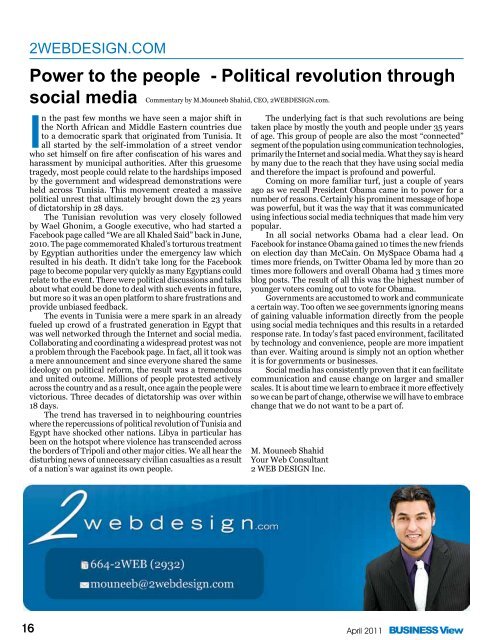Kevin Hursh Awards & Honours - Saskatoon Chamber of Commerce
Kevin Hursh Awards & Honours - Saskatoon Chamber of Commerce
Kevin Hursh Awards & Honours - Saskatoon Chamber of Commerce
Create successful ePaper yourself
Turn your PDF publications into a flip-book with our unique Google optimized e-Paper software.
2WEBDESIGN.COM<br />
Power to the people - Political revolution through<br />
social media Commentary by M.Mouneeb Shahid, CEO, 2WEBDESIGN.com.<br />
In the past few months we have seen a major shift in<br />
the North African and Middle Eastern countries due<br />
to a democratic spark that originated from Tunisia. It<br />
all started by the self-immolation <strong>of</strong> a street vendor<br />
who set himself on fire after confiscation <strong>of</strong> his wares and<br />
harassment by municipal authorities. After this gruesome<br />
tragedy, most people could relate to the hardships imposed<br />
by the government and widespread demonstrations were<br />
held across Tunisia. This movement created a massive<br />
political unrest that ultimately brought down the 23 years<br />
<strong>of</strong> dictatorship in 28 days.<br />
The Tunisian revolution was very closely followed<br />
by Wael Ghonim, a Google executive, who had started a<br />
Facebook page called “We are all Khaled Said” back in June,<br />
2010. The page commemorated Khaled’s torturous treatment<br />
by Egyptian authorities under the emergency law which<br />
resulted in his death. It didn’t take long for the Facebook<br />
page to become popular very quickly as many Egyptians could<br />
relate to the event. There were political discussions and talks<br />
about what could be done to deal with such events in future,<br />
but more so it was an open platform to share frustrations and<br />
provide unbiased feedback.<br />
The events in Tunisia were a mere spark in an already<br />
fueled up crowd <strong>of</strong> a frustrated generation in Egypt that<br />
was well networked through the Internet and social media.<br />
Collaborating and coordinating a widespread protest was not<br />
a problem through the Facebook page. In fact, all it took was<br />
a mere announcement and since everyone shared the same<br />
ideology on political reform, the result was a tremendous<br />
and united outcome. Millions <strong>of</strong> people protested actively<br />
across the country and as a result, once again the people were<br />
victorious. Three decades <strong>of</strong> dictatorship was over within<br />
18 days.<br />
The trend has traversed in to neighbouring countries<br />
where the repercussions <strong>of</strong> political revolution <strong>of</strong> Tunisia and<br />
Egypt have shocked other nations. Libya in particular has<br />
been on the hotspot where violence has transcended across<br />
the borders <strong>of</strong> Tripoli and other major cities. We all hear the<br />
disturbing news <strong>of</strong> unnecessary civilian casualties as a result<br />
<strong>of</strong> a nation’s war against its own people.<br />
The underlying fact is that such revolutions are being<br />
taken place by mostly the youth and people under 35 years<br />
<strong>of</strong> age. This group <strong>of</strong> people are also the most “connected”<br />
segment <strong>of</strong> the population using communication technologies,<br />
primarily the Internet and social media. What they say is heard<br />
by many due to the reach that they have using social media<br />
and therefore the impact is pr<strong>of</strong>ound and powerful.<br />
Coming on more familiar turf, just a couple <strong>of</strong> years<br />
ago as we recall President Obama came in to power for a<br />
number <strong>of</strong> reasons. Certainly his prominent message <strong>of</strong> hope<br />
was powerful, but it was the way that it was communicated<br />
using infectious social media techniques that made him very<br />
popular.<br />
In all social networks Obama had a clear lead. On<br />
Facebook for instance Obama gained 10 times the new friends<br />
on election day than McCain. On MySpace Obama had 4<br />
times more friends, on Twitter Obama led by more than 20<br />
times more followers and overall Obama had 3 times more<br />
blog posts. The result <strong>of</strong> all this was the highest number <strong>of</strong><br />
younger voters coming out to vote for Obama.<br />
Governments are accustomed to work and communicate<br />
a certain way. Too <strong>of</strong>ten we see governments ignoring means<br />
<strong>of</strong> gaining valuable information directly from the people<br />
using social media techniques and this results in a retarded<br />
response rate. In today’s fast paced environment, facilitated<br />
by technology and convenience, people are more impatient<br />
than ever. Waiting around is simply not an option whether<br />
it is for governments or businesses.<br />
Social media has consistently proven that it can facilitate<br />
communication and cause change on larger and smaller<br />
scales. It is about time we learn to embrace it more effectively<br />
so we can be part <strong>of</strong> change, otherwise we will have to embrace<br />
change that we do not want to be a part <strong>of</strong>.<br />
M. Mouneeb Shahid<br />
Your Web Consultant<br />
2 WEB DESIGN Inc.<br />
16 April 2011 BUSINESS View






